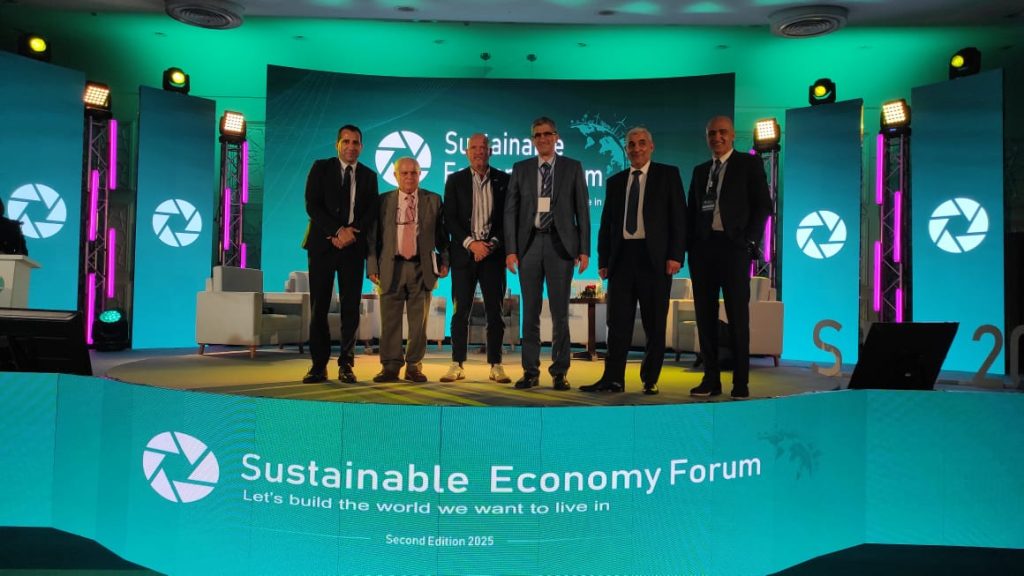The “Sustainable Economy Forum” – second edition – brought together leading voices from the energy sector at the El Aurassi Hotel on June 28 to explore Algeria’s role in the global energy transition.
From carbon capture innovation to renewable energy investments, industry experts underscored the urgency of adopting pragmatic and collaborative approaches to build a resilient, low-carbon future.
Rethinking Fossil Fuels: From Problem to Part of the Solution
To begin the discussion, moderator Choeib Boutamine, senior expert in energy and CEO of Ranadrill, set the stage by challenging a common misconception: that energy transition means abandoning oil and gas altogether. “This is completely wrong,” he said. “To reach our targets, we must recognize the role that fossil fuels—especially natural gas—can play as a bridge to a greener future.”
Indeed, natural gas, with significantly lower CO₂ emissions than coal, represents a crucial step toward sustainable energy. Currently, 35% of global electricity is still generated from coal, which emits over 60% more CO₂ than natural gas. Boutamine emphasized the need for a phased transition—from coal to oil, and eventually to gas—as a realistic pathway forward.
The Renewable Revolution: Opportunities in Solar and Wind
Next, attention turned to the growing dominance of renewable energy. “We must invest heavily in solar, wind, and other clean sources,” said Boutamine. He cited China’s leadership in solar panel manufacturing as proof of market viability, urging African countries to accelerate their renewable deployment.
Panelist Bilal Kalash, Director of Renewable Energies at Sonatrach, reaffirmed this vision, highlighting Algeria’s vast potential for solar and wind. “We see this not as a threat, but an opportunity. Renewables are now cost-competitive with fossil fuels,” he affirmed, citing ongoing solarization projects at oil and gas sites and large-scale tree planting as part of Sonatrach’s carbon offset strategy.
Technology as a Bridge: Innovating Within Oil and Gas
Turning to technological solutions, Boutamine stressed that renewables alone are not sufficient. “We must also deploy innovations in the oil and gas sector to reduce emissions,” he noted, referencing enhanced oil recovery (EOR), carbon capture and storage (CCS), and carbon capture, utilization and storage (CCUS) as critical tools.
Warren Murdoch, CEO of Occidental (OXY), elaborated on this strategy. “We’ve transformed into a carbon management company,” he declared. OXY is investing billions in direct air capture technology and low-emission power generation projects like NetPower, which burns gas with oxygen to produce only CO₂ for sequestration and reuse.
A National Imperative: Algeria’s Transition Challenge
Former Minister of Energy Abdelmadjid Attar took a deeper look at Algeria’s domestic energy landscape. “Our current consumption model is unsustainable,” he warned. With 99% of electricity generated from gas, and 52% of that consumed by households, Algeria’s energy structure is under immense strain.
Attar warned that, without significant policy changes, Algeria may face a rupture in gas export capabilities by 2030. “This isn’t just about saving gas—it’s about national security and climate resilience,” he stated. He called for massive investments in energy efficiency, electrification, and a dramatic acceleration of renewable energy deployment, alongside the exploration of green hydrogen and nuclear energy.
Sonatrach’s Strategic Shift: Climate Alignment and Action
To align with global climate commitments, Sonatrach has launched a climate strategy rooted in the Paris Agreement and the Sustainable Development Goals. According to Fouad Saoudi, Central Director of HSE at Sonatrach, the group aims to reach net-zero flaring by 2030 and balance its emissions with both technological and natural carbon sinks by mid-century.
Among the initiatives: boosting energy efficiency, scaling up renewables, reducing methane emissions, and planting 420 million trees over 10 years. “It’s a $1 billion effort that shows our commitment,” Saoudi explained, underscoring the necessity of regional cooperation and investment to achieve these ambitious targets.
Private Sector Perspectives: R&D and International Synergies
Representing TotalEnergies, Larbi Bouziane emphasized the importance of research, innovation, and partnerships. “We invest nearly $1 billion annually in R&D, with 3,500 researchers across 18 sites,” he noted. The goal: reach 100 GW of renewable capacity by 2030, including projects tailored for Algeria’s sunny landscape.
On a smaller scale, TotalEnergies is piloting 5 MW solar projects integrated into gas facilities to build local expertise. “These aren’t just about energy—they’re about creating momentum and local capacity,” Bouziane said.
Africa’s Regional Role: A Gas Hub for the Continent
Algeria’s regional potential was once again highlighted by Attar, who positioned the country as a critical hub in Africa’s future energy network. “Our infrastructure is in place—gas fields, ports, liquefaction terminals,” he said. With new discoveries in Nigeria, Mauritania, and Senegal, cross-border projects like the Nigeria-Algeria pipeline could transform the continent’s energy economy.
Conclusion: Towards a Balanced Energy Future
In closing, the panelists agreed on one central message: oil and gas remain essential, but must evolve. “We’re not eliminating hydrocarbons,” Boutamine concluded. “We’re cleaning them, integrating them with renewables, and investing in tomorrow’s technologies.”
The Sustainable Economy Forum ended on an optimistic note, with leaders calling for unity, ambition, and action. From corporate boardrooms to national strategies, the path to a sustainable Africa will require collaboration, innovation, and a bold reimagining of the continent’s energy future.

